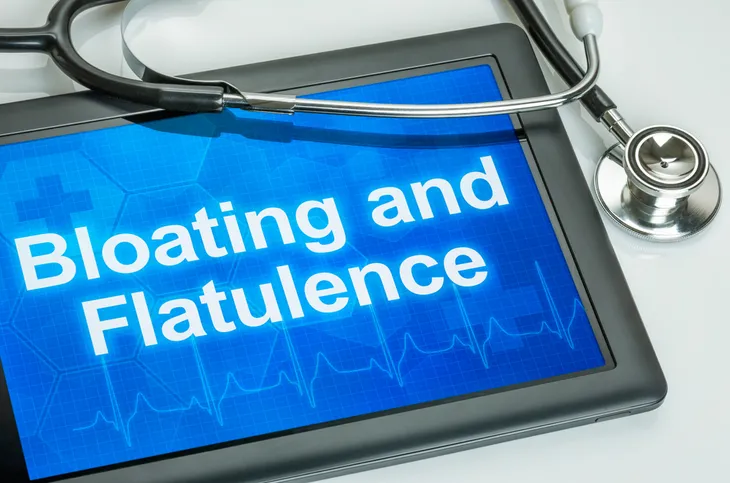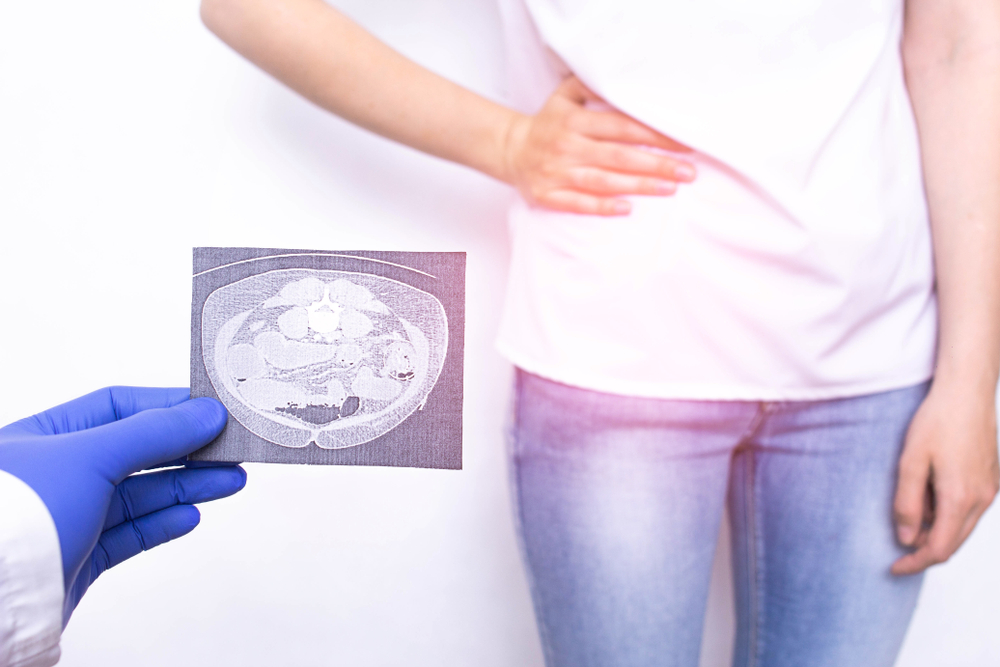While many medical professionals claim the appendix is a “vestigial organ” without function, immunology researchers at North Carolina’s Duke University Medical Center explain that the appendix may benefit the human digestive system by contributing “good” bacteria that aids digestion in the gut.
Appendicitis occurs when the appendix (a narrow tube-shaped pouch at the end of the large intestine) becomes blocked (by faeces or infection) and painfully inflamed. The key is the surgical removal of the organ before it bursts, which can lead to a fatal infection spreading throughout the abdomen.
The 20 most common symptoms leading up to appendicitis are…
1. Abdominal Pain
The most commonly attributed symptom of appendicitis is sharp pain in the lower right abdomen or pain that begins at or around the belly button and shifts to the lower right abdomen. This is the general area where the appendix, a small sac that protrudes from the large intestine.
The pain of appendicitis is typically constant, meaning it doesn’t come and go or resolves completely. It often causes patients to double over in pain and is typically described by patients as like being “jabbed with a knife.”
2. Flu-Like Symptoms
In addition to intense abdominal pain, appendicitis can also cause flu-like symptoms, including achy muscles and fever.
The fever associated with appendicitis can be low grade, but it will almost always worsen as the illness progresses. This flu-like fever may be accompanied by nausea that intensifies and is unable to be ignored.
3. Cramps
Not all appendicitis patients may experience sharp unbearable pain in the abdomen right away. In fact, many female patients compare the early pain to menstrual cramps.
4. Lower Back Pain
Patients experiencing early appendicitis can develop a dull pain in the lower back that gets worse over time. Some people who have an appendix that’s located behind the colon. In this case, patients can develop pain in the lower back or pelvic region.
 sebra / Shutterstock
sebra / Shutterstock5. Diarrhea
Many patients mistake the early stages of appendicitis for an upset digestive system because it causes stomach cramps, gas, bloating, chills, nausea, and diarrhea. Health.com warns, “If you have mild diarrhea — especially if there is a lot of mucus in it — in addition to lower-right abdomen pain, see your doctor.”
6. Constipation
Patients often compare the pain of early appendicitis to that of being constipated or feeling as if they have to pass gas but cannot. This can lead to abdominal pain that feels like cramping, which builds gradually over a period of time.
 Dragana Gordic / Shutterstock
Dragana Gordic / Shutterstock7. Nausea and/or Vomiting
All of the symptoms of appendicitis are uncomfortable and painful, and this one is no different! Soon after the abdominal pain begins, a wave of nausea will arise, which could also lead to vomiting.
Health.com notes that appendicitis might feel similar to the symptoms of a stomach bug. What starts out as simply not feeling well and a loss of appetite, quickly progresses into nausea and even vomiting. Keep an eye on whether the condition is improving or worsening to get a sense of whether these symptoms are a hint of something more serious.
8. Abdominal Swelling
Abdominal swelling is among what WebMD describes as one of the “classic symptoms” of appendicitis. Once the appendix is inflamed, the abdomen will also swell up and become extremely tender.
It’s important to remember there’s a difference between being bloated and having a swollen abdomen. A great way to test for abdominal pain/swelling is to push on the lower right part of your abdomen. If there is pain when the pressure is released, it could be appendicitis-related abdominal pain. Contact a doctor right away if this is experienced in addition to several other symptoms on this list, such as fever, nausea and/or vomiting, and flu-like symptoms.
9. Inability to Pass Gas
If you’re feeling bloated and gassy after eating a bunch of junk food, it’s probably just a little bit of indigestion. But it’s a whole different story if this bloating lasts for several days and worsens instead of getting better.
If you’ve been bloated for a long period of time and are experiencing a lot of gas accompanied by abdominal pain or an inability to pass gas, it could be something a lot more serious than indigestion. You could be in the early stages of appendicitis.
10. Flatulence
While some people might have issues passing gas, others might have the opposite problem. Several people spoke to SELF about what their appendicitis experience was like. Many of them reference gas and how the alleged gas pains continued to increase until it was unbearable. An appendicitis can often have your stomach hurting as if you’re having gas. This is a reason why an appendicitis can be mistaken for something less harmful.
 Zerbor / Shutterstock
Zerbor / Shutterstock11. Loss of Appetite
People who suffer from appendicitis will experience a loss of appetite, mainly because of all the other uncomfortable symptoms such as bloating, nausea, constipation, and diarrhea.
Loss of appetite can also be a precursor of what’s to come nausea and vomiting. According to MedicineNet, people suffering from appendicitis often feel nausea because of an “intestinal obstruction from the expanding inflammatory mass or abscess rather than from local inflammation.”
12. Dull Pain Near Belly Button
Despite being near the end of the list, this symptom is actually one of the first signs of appendicitis. When it comes to appendicitis, most people think of a pain in the lower right abdomen, which makes sense because this is where the appendix is located.
But before it even gets to that point, the symptoms may begin as a dull pain near the belly button. It will later turn into a sharp more intense pain as it moves into the lower right abdomen. According to the Mayo Clinic, some people might experience this pain in different areas, particularly pregnant women or children.
13. Painful Urination
People who are experiencing appendicitis don’t just suffer from constipation, their bladder joins in on the fun as well! While this isn’t the case for everyone, many people will experience painful urination or the inability to pass urine at all.
Positive Health Wellness lists a few reasons as to why this might happen. First and foremost, it’s most likely due to the infection and inflammation of the appendix. The source states, “It is possible there is a blockage somewhere that makes it hard for the kidneys to pass the waste to the bladder and leave the body.” Second, it could also mean the infection is spreading to the bladder.
14. Pain That Worsens With Movement
Appendicitis pain can become debilitating as time goes on, which can make basic movements very painful. This includes everything that’s usually a pain-free experience such as lifting, walking, coughing, taking deep breaths, and sneezing. Even a simple touch from another person could trigger a sudden jolt of pain.
15. Trouble Sleeping
When you have appendicitis, the pain usually isn’t subtle — especially once you’ve had it for a certain period of time. Dr. Michael Payne, MD spoke to Health.com about how his patients describe appendicitis as a pain like no other. Pain from appendicitis can be so intense that it wakes you up from sleeping. If this is the case, the severity is at a point where you should get immediate medical assistance.
 Tero Vesalainen / Shutterstock
Tero Vesalainen / Shutterstock16. Low-Grade Fever and Chills
People with appendicitis will usually get a mild fever. Healthline reports an appendicitis-related fever can get between 99°F and 100.5°F, along with the chills. A temperature higher than 101°F and increase in heart rate could indicate your appendix has burst.
 Prostock-studio / Shutterstock
Prostock-studio / Shutterstock17. Rebound Tenderness
Another symptom that could indicate appendicitis is rebound tenderness. Health.com reports that rebound tenderness is when you push on the lower right of your abdomen and experience pain releasing pressure. Don’t press on it again if it hurts and see a doctor right away, especially if you’re experiencing other appendicitis-related symptoms.
 Andrey_Popov / Shutterstock
Andrey_Popov / Shutterstock18. Symptoms in Children
Don’t rule out an appendicitis behind your child’s stomach ache. Children can also get appendicitis and there are similar symptoms to look out for. This includes persistent pain around the belly button or lower right belly, low-grade fever, loss of appetite, nausea, and diarrhea. Parents should also check for a swollen belly. Two signs of a burst appendix are if the pain spreads across the belly or if the child experiences a high fever.
 Kunlanan Yarist / Shutterstock
Kunlanan Yarist / Shutterstock19. Possible Complications
If left untreated, there are a few health concerns that could arise due to an appendicitis. The appendix could rupture and spread an infection throughout the abdomen, according to Mayo Clinic. This would require doctors to not only remove the appendix, but to clean the abdominal cavity to treat the infection.
Another complication could be the development of an abscess pocket. Doctors would have to drain the abscess and clear the infection before removing the appendix.
 Gorodenkoff / Shutterstock
Gorodenkoff / Shutterstock20. Appendicitis Treatment
If you suspect you have appendicitis, go to the hospital immediately. As appendicitis pain progresses, it indicates that bacteria and inflammation is multiplying, and the blockage in the lining of the appendix is swelling with pus.
Eventually the appendix can rupture in the abdomen (peritonitis) or cause a abscess to form, which will need to be drained before the appendix is surgically removed.















